Natacha Paschal on lockdown-life in Paris, celebrating sisterhood, her love for children’s drawings, and parodying luxury fashion advertising.
TYC: What does your everyday life in lockdown look like at the moment?
Natacha Paschal: I’m trying to be a good citizen by staying at home as much as possible. Usually, I do a lot of walking in Paris, and I love to meet up with friends for a coffee and then meander through the streets of Marais. I live in a small apartment close by that also serves as my studio. So, I was already used to working at home, but still, it’s not that easy if you can only connect with family and friends virtually. I’m trying to keep my body and mind fit by doing a lot of yoga and meditation at home and also treat myself with a little shopping. I bought a beautiful black leather jacket with fringes, and I envisioned myself wearing it everywhere after quarantine. Some might say shopping for clothes is frivolous at the moment but after only wearing leggings and dirty painting clothes for the last couple of weeks, I enjoy dressing in something special that I like because it immediately makes me feel good.
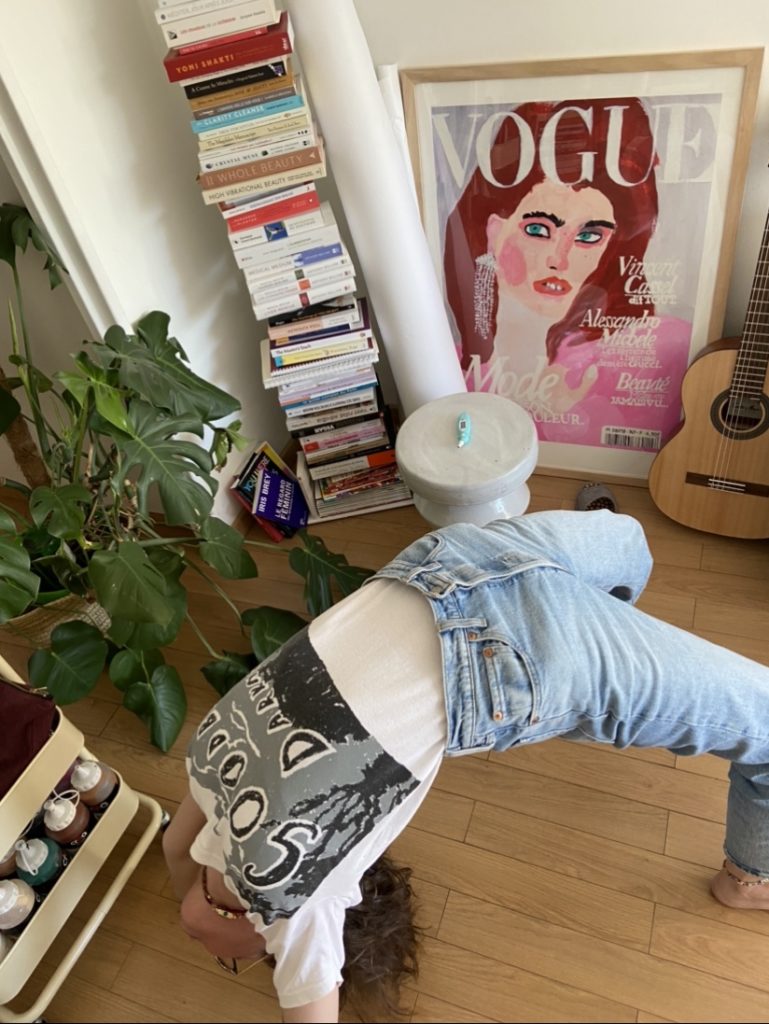
Did you notice a loss of income due to the pandemic?
Natacha Paschal: I’m not sure, as I don’t know which projects would have been proposed to me otherwise, but at least at the moment, it feels like I haven’t been affected that much. I just recently finished a project for Bulgari, and via Instagram, I’ve received some smaller requests. I did an Instagram Live for The Art Gorgeous, a website related to the art world but from a girl’s perspective celebrating sisterhood. I also did an illustration for Support Magazine, which is dedicated to contemporary drawing and features creatives from all over the world. Every month they are asking an artist to illustrate the month, so I had the pleasure to welcome the month of May. I have been quite active during the last couple of weeks. Other projects involved a painting for G.I.V.E. a new publication by Condé Nast and some illustrations for Dokvary, which is a ceramics and interior design brand. I’m also selling my prints on Instagram and my homepage. I went through some of my work and thought it would be nice to offer the paintings at a reasonable price.
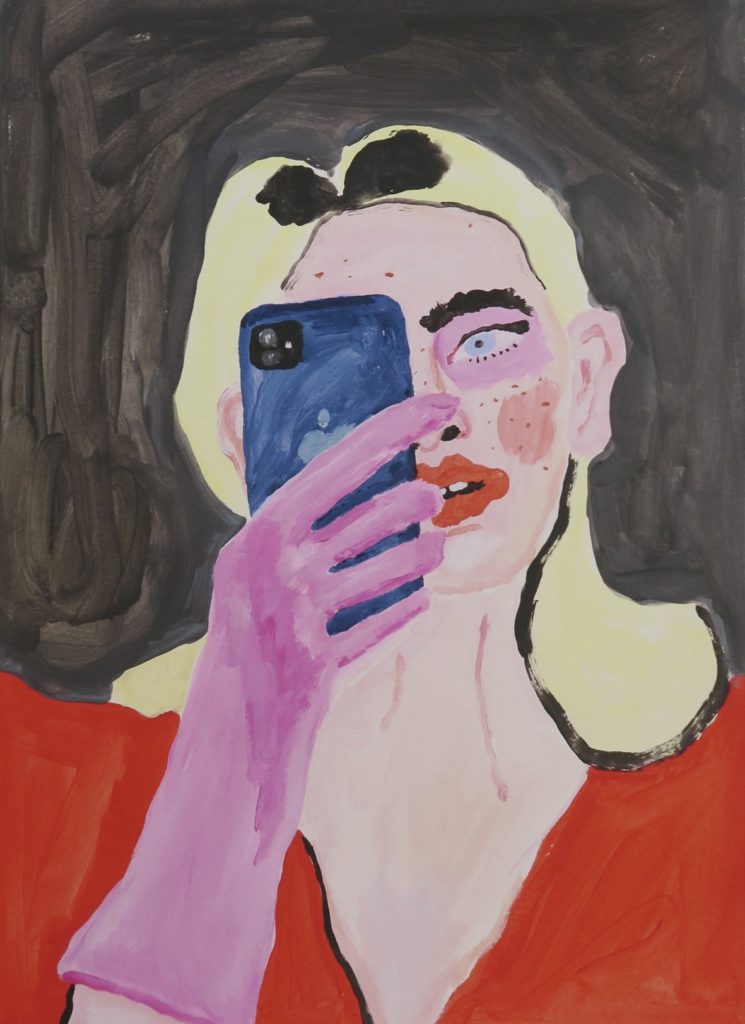
Natacha Paschal’s illustrations dedicated to the month of May for Support Magazine (right) and the project she did for G.I.V.E. Magazine (left), a new publication on culture and society by Condé Nast.
You just recently also did a project with Studio 13/16 by the Centre Pompidou. What was it about?
Natacha Paschal: Every three months, they ask an artist to do illustrations for the Instagram account of Studio 13/16, so this year I was the first one and contributed paintings from January to April. My topic was fashion and the representation of clothes in society. This project also motivated me to take the step of working independently without an illustration agency. It just felt like the right moment as I received a lot of requests directly via Instagram.
What I also loved about the project was the freedom they gave me. I had a “Carte Blanche” and could do whatever I wanted. I like working in the realms of clothes and identity, topics that deal with how you can hide behind clothes, or how you can express your personality through fashion.
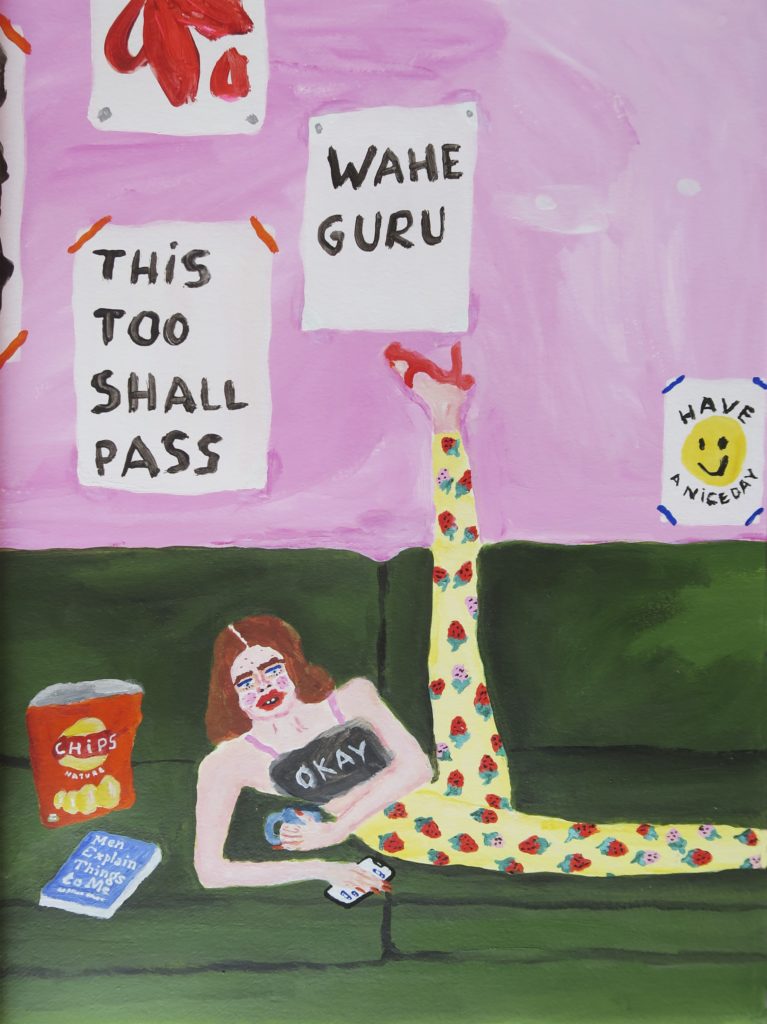
Natacha Paschal for Studio 13/16 an art space at the Centre Pompidou dedicated to 13-16-year-olds. The first space exclusively dedicated to teenagers in a major cultural institution, Studio 13/16 offers a unique program consisting of meetings with artists of all kinds.
Where does your interest in fashion originate?
Natacha Paschal: I’ve been obsessed with fashion magazines and fashion advertising since I was a kid. For me, it’s an art form. I grew up in a tiny village near Paris, and at the end of my street, there was a little newspaper kiosk. Every time I had some pocket money, I went there and spent every cent on magazines. I remember at the age of seven, I was cutting out some illustrations of a magazine, and I loved it, but I had no idea that you could actually earn money by doing illustrations and that it was a real job. I was buying all these women magazines like Glamour, Vogue, etc. but at the beginning, I didn’t understand the articles about diets, counting calories, and looking a certain way. I was very innocent. I was just intrigued by the images, doing collages, and didn’t pay much attention to the content. I think you still get influenced by the pictures of these perfect women in advertising without being aware of it. With my mother being a feminist, I also have a consciousness that beauty standards are unhealthy and can hurt women. Knowing that helped me to distance myself from it and not take it too seriously.
That also shows in your paintings, because you use a rather humorous approach to fashion.
Natacha Paschal: I started by reinterpreting Vogue covers with a comic take on it, making fun of luxury fashion advertising and its penchant for drama. I did a kind of theatrical parody because I always have to laugh at these impossible poses shown in fashion advertising. I thought it would be fun to reinterpret the fashion covers of Vogue my way, doing a deformation. So the women I portray don’t live up to traditional beauty standards. They have rings under their eyes or pose in a way so that it looks as if they are stumbling. Children’s drawings especially inspire me; I love their style because they are so honest and not perfect but at the same time so personal. And there is this lighthearted and unpretentious approach to art I really love.
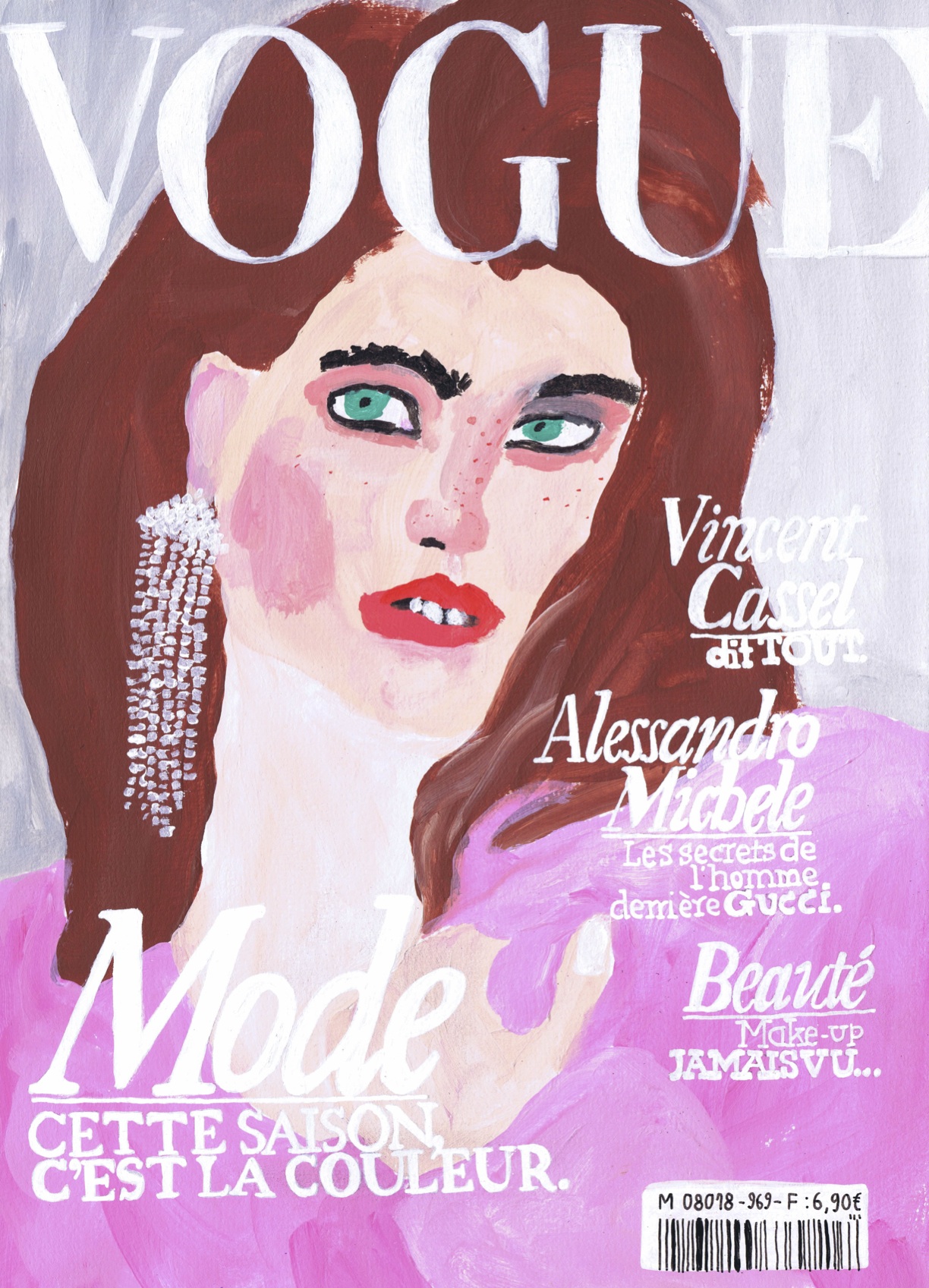
Has your creative approach to fashion also had an effect on how you consume it?
Natacha Paschal: In my personal life, I am nowadays much more conscious about my fashion choices. I haven’t spent any money on fast fashion in the last two years and now prefer to buy from small brands producing ethically made clothes. It has been a journey for me. I try to be a better consumer and think of the responsibility I have. Of course, I’m not perfect and I’m interested in a new dress or a new pair of boots, sometimes I even feel guilty because it’s such a controversial industry.
Did you have time to reflect on your work in lockdown?
Natacha Paschal: A few months ago, I was not in a good place. I felt overwhelmed by all the projects I took on. I did the communication with the clients, the research, and then there was the actual process of painting. As a creative, you also need some time off, which is probably the most crucial aspect to develop an idea and get inspiration. I didn’t have this time a few months ago and continuously felt under pressure to deliver creative work in bulk. Sometimes I even didn’t like what I was doing, but I didn’t have the energy or time to improve it. So the lockdown slows everything down and was a huge savior for me. I stopped for a month to get my energy back and took time to reflect, and, despite all the horror of the pandemic itself, this period of deceleration has personally helped me a lot. So I took advantage of the lockdown and did a lot of meditation and yoga. I also thought about the masks I wear in the art world, which can be very exhausting sometimes. You are playing a social role and behave a certain way, especially when you meet new people. Sometimes it would be nice to be more honest and raw and show more facets of yourself. I even thought about putting in my Instagram bio “Social Role: Artist,” because that’s only one aspect of me as a person.
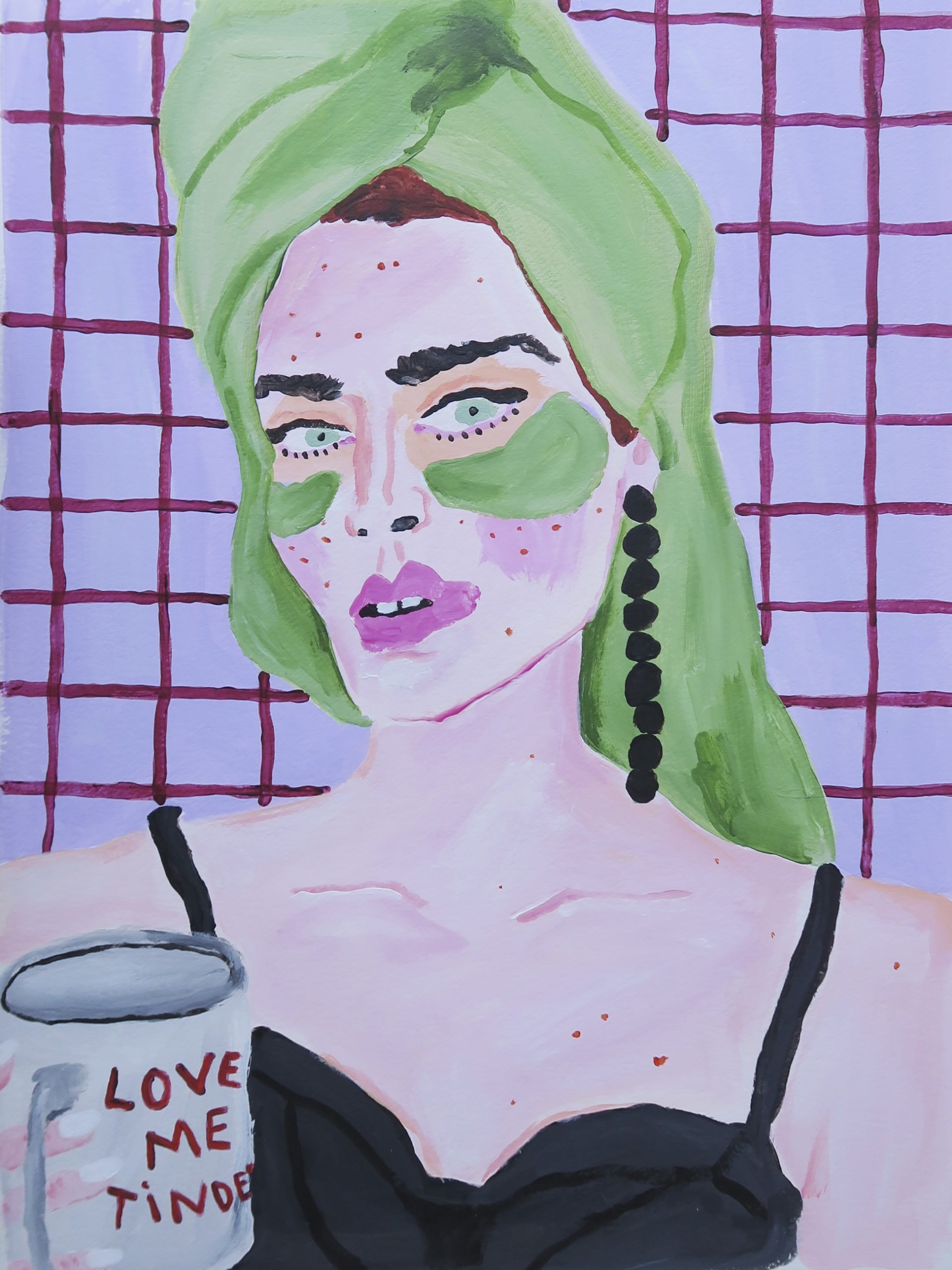
What would you do differently in the future when it comes to sustaining yourself as an artist?
Natacha Paschal: I have this thing when I do commission work that I sense this tension, and I don’t feel free of doing the things I usually would. Of course, that’s nothing new for creatives, and I’m not the only one with that feeling. I made the mistake that I accepted a lot of work that didn’t feel right for me. I didn’t even like the results because it just didn’t look like me in the end. So sometimes you have to communicate to the client the things that matter to you openly and don’t agree to do certain things that are against your creative integrity just because you need the job. That was a lesson I learned. I get many requests from individuals who want me to paint their portrait. It’s sometimes funny because they expect me to portray them realistically, exactly how they look, so they are basically asking for a photograph instead of a painting. But with my style, that’s not possible to do. So, to prevent misunderstandings, I say from the beginning that it will be an interpretation, so nobody will be surprised in the end.
This interview has been edited for length and clarity.
“Checking In…” is an interview series with creatives of different disciplines from all over the world sharing their individual stories on the coronavirus crisis and how they navigate through it.





